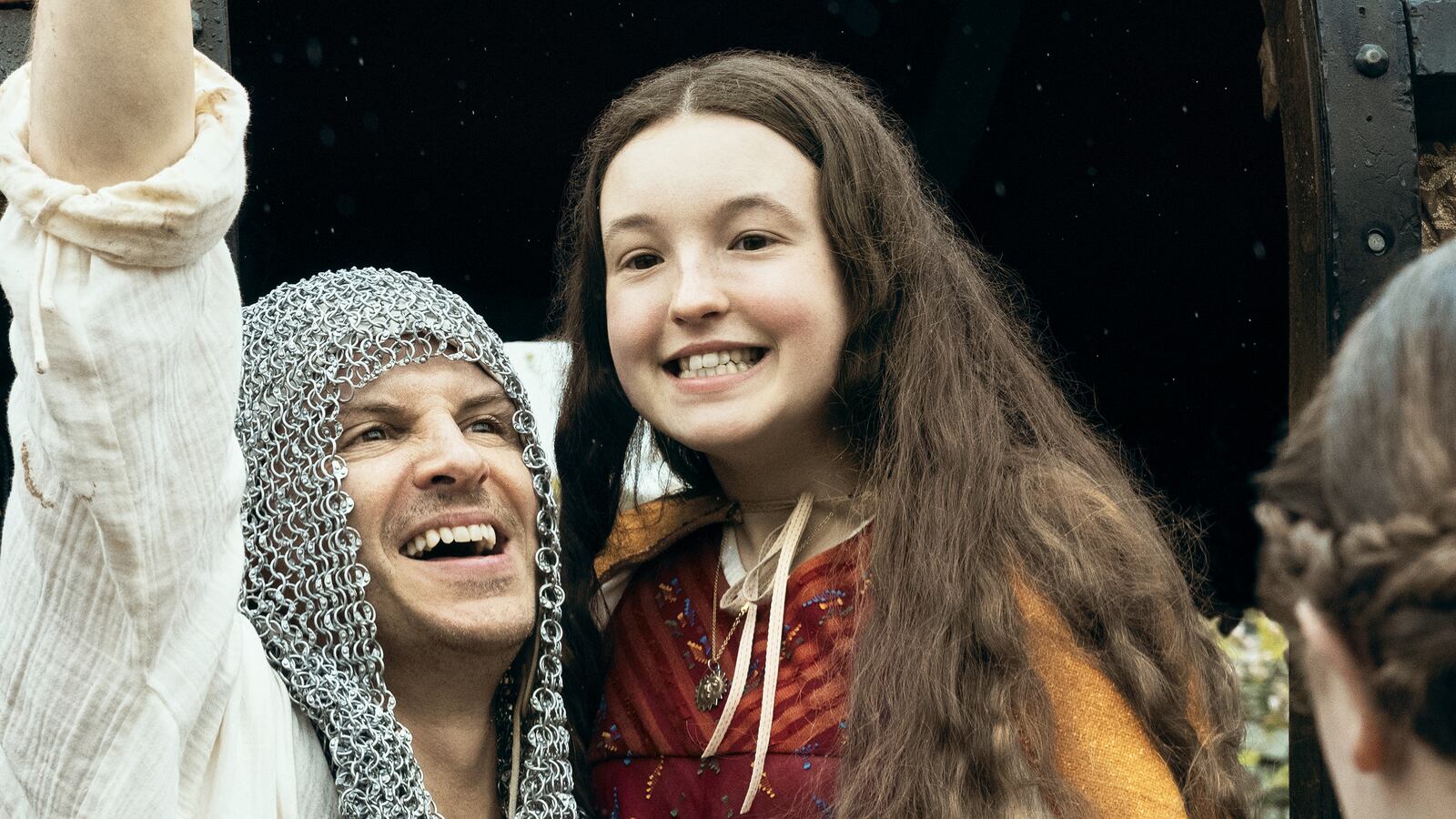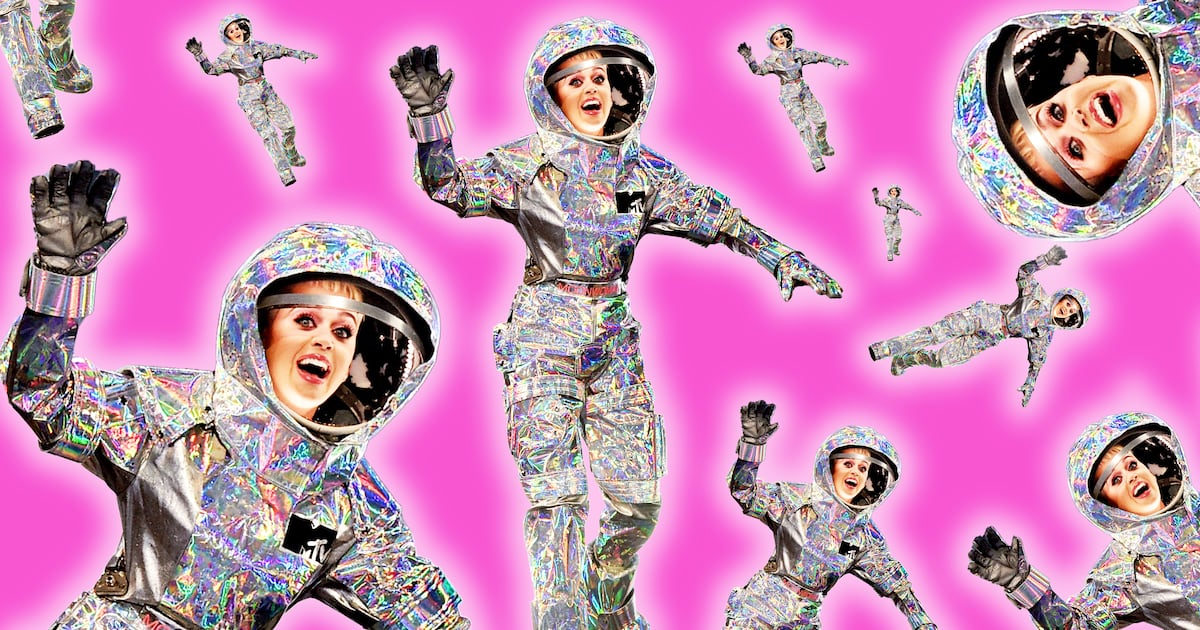Bella Ramsey is finally smiling. Winding her way through Game of Thrones, His Dark Materials, Becoming Elizabeth, and HBO’s upcoming adaptation of The Last of Us, Ramsey has taken a quick detour on her young acting journey for something more chipper. For once, Ramsey tells me, her face hurt from giggling all day as she filmed Catherine Called Birdy.
Working with the ever-controversial Lena Dunham (Ramsey, for her part, has nothing but praise for the Girls creator), the young actress got to flaunt her comedic chops as sweet little Birdy, a girl living in 13th-century England who refuses to marry. Her father, Lord Rollo (Fleabag’s Andrew Scott), loses his wits. The pair bicker, banter, and tease one another—it’s hilarious.

When she was younger, Ramsey took comedy classes with her sister at a local theater group. Since then, she hasn’t had many opportunities to flex that funny bone—and with a comedic player like Andrew Scott by her side, she couldn’t resist.
“It was cool to leave every day with smile lines from laughing,” she tells The Daily Beast over Zoom. “Because I tend to accidentally mesh so much with the person I’m playing, it’s nice for it to be someone lighter. Not to say that I don’t love playing the dark, intense, depressed characters—I also do love that!”
What makes Catherine Called Birdy even better is that it’s one of those rare gems that’s as funny as it is touching, though it’s never cloying or overly saccharine. Birdy’s a genuine, pesky, hormonal 14-year-old girl. Dunham achieved this, Ramsey says, by allowing the young actress to improvise and add notes where she saw fit.
For example: The kiss scene was all wrong, she said. Birdy wouldn’t like her first kiss. It would be gross, sloppy, weird, short—and she’d never, ever want to do it again. These kinds of edits, coming from the mind of a teenage girl herself, were key to informing the character of Birdy, who Ramsey could easily identify with.
Ahead of Catherine Called Birdy’s debut on Amazon Prime Video, Bella Ramsey sat down with The Daily Beast—just hours after The Last of Us day took hold of the internet!—to chat about mudslinging, working with Lena Dunham, and, yes, first kisses.
You’ve done quite a lot of period work in your career so far.
The fact that I’ve done a lot of period work is actually quite accidental. Everyone always does say that I have a “period face.” I don’t know if that’s a compliment or not.
I think it is. What’s your favorite aspect of filming a period piece?
Two parts, actually. I like the costumes. They really transform you. As soon as you put your costume on, you’re immediately transported into a different timeframe, a different character, especially if you’re wearing corsets. They’re not the best, but they definitely help you be in character.
I also like learning about whatever time period I’m in. At school, I hated history. I don’t think it was ever taught in a way I found exciting. I’ve always preferred learning things for myself, rather than being forced to learn them. The idea that I get to know, suddenly, so much about a different time period is so cool. It’s the only form of time travel we’re ever going to have. Although, at the rate things are moving, who knows?
I love that big mud-slinging scene at the beginning. Was that as fun as it looked?
It was fun—at the time. Who doesn’t want to run around in the mud with their friends? Afterwards, it wasn’t so fun. Trying to wash all that mud out in a temperamental trailer shower? It was interesting. But at the time, it was so much fun. They did a 15 minute-long take of us playing with mud. I love the way it turned out.
The movie respects you and your youth—the mud-slinging!—as opposed to always siding with the adults and their maturity. You teach them, instead of vice versa. Did you learn anything from Birdy?
Birdy is the version of me that I aspire to be. We’re very similar in lots of ways. She’s just bolder than I am. She’s more rebellious. I’ve always had this dream of being rebellious, but I’m not very good at it. Birdy is, however. It was a reminder that you don’t have to do what people think you should do—you have the autonomy to push against those boundaries and explore what might be possible.
In the end, her rebellion against her dad is actually successful. In other period stories about young women, that’s not always the case.
Funnily enough, her rebellion comes to fruition when she accepts her fate. She’s like, “There’s no point in me fighting anymore. It’s happening, so I’m going to make the best of it.” She sticks her tongue out at everyone to say goodbye to everybody, but inside she’s petrified. But I love the fact that from her actually accepting her fate, that’s where her rebellion flourishes.
At the beginning of the film, Birdy is so full of youth and naiveté. But she goes through a lot, facing grueling marriage proposals, her mother’s miscarriage, and her best friend’s heartbreak. Do you think that weighs on her, by the end of the film?
That energy of Birdy is the core of who she is. She’s a chaotic whirlwind of emotions. But that’s the experience of being a teenager. She’s living messily. She definitely matures throughout the film, and she learns about what it means to be a young woman in that time—also that everyone around her is also in their own small hell. At the beginning, she thinks she’s the one with any troubles and any strife. In the end, she does realize that everyone is experiencing the same mess. She emotionally matures. But she’s still wild and rebellious!
Does she get that wild rebelliousness from her mom or her dad?
From her dad, to be honest. Her and Rollo are very, very similar. That’s why they clash so much. It’s like two bulls butting heads, but they’re the same person.
Birdy’s relationship with Rollo is so fun to watch. Why was it important for him to be more of a positive influence on her, rather than a harsh, cruel father selling her off to marriage?
That’s been expanded [upon] and developed from the book, where Rollo was much more of this brutish, typical medieval father. I love the way that Andrew and Lena developed Rollo into this very complex, feeling, emotional man… Any brutishness that he does—when he beats her hand, he doesn’t want to do that. He hates himself for it.
You and Andrew Scott are a good father-daughter duo. I would watch a whole series of the two of you.
He’s hilarious. We’ve just done this little press tour together, and we ended up descending into a 10-minute laughing fit, much to the dismay of everyone around us. But his energy is so funny. He’s naturally charismatic.

Your narration is also really fun—it reminds me of a younger version of Bridget Jones’s Diary. Did you like recording that?
I was shooting The Last of Us at that time, and that’s a totally different thing, tonally. It was difficult to switch back. I sort of struggled with recording it after, because I was so aware of what an important film [Catherine Called Birdy] was. It was a lot of pressure! There’s a point where you just have to trust people when they say it’s good.
Your character gets her first kiss in this movie, but it’s not romantic at all. Why didn’t your character dabble in romance?
That kiss scene was slightly different from how Lena originally wrote it. We got there to film the scene, and it felt like a good touch for [Birdy] not to enjoy it. She’s been thinking about this, building it up in her head—first kiss! What is this kiss thing that everyone goes so mad for? And then she just was like, “That was nothing and boring.” First kisses aren’t always great. I love the fact that Birdy was almost disgusted by it.
But there’s also the realization that this is possibly the only kiss or interaction with a human being that she’ll ever get to choose for herself, so that perspective is cool. “This was nice because I got to choose to do it,” rather than, “This was nice because kissing is this great thing.”
Did you get to provide more feedback to Lena?
I did, that scene being one of them. Lena totally created an environment where every single person on set had a voice, and that voice was respected. Cast and crew. That’s why I really love working with her. There was space to improvise, to make it feel more truthful.
The scene where I’m shouting at Alice’s dad [Lord Gideon Sidebottom, played by David Bradley], that was one that felt organic. That was improvised. Sometimes, you read a script, and something doesn’t feel right. That’s nothing on the writing, nothing on you, it just doesn’t match. Lena was just like, “Yeah, do whatever you want!” The great thing about Lena is that she kept most of this improvisation in. Sometimes, you’re given a chance to improvise, but nothing makes the final cut. But all of it did!






